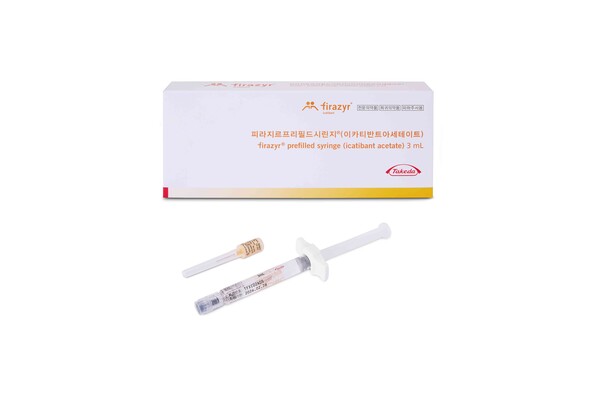Takeda Korea said that the reimbursement for its hereditary angioedema (HAE) treatment, Firazyr (ingredient: icatibant acetate), has been expanded to cover up to four doses per prescription starting Dec. 1.
HAE is a rare condition caused by a deficiency or dysfunction of C1 esterase inhibitor, resulting in recurrent episodes of swelling without hives or itching. Acute attacks affecting the upper airway or gastrointestinal tract can lead to life-threatening complications such as airway obstruction or intestinal blockage. Symptoms can appear within hours and persist for up to five days, with severity varying unpredictably.

Under the revised criteria, the reimbursement limit for Firazyr has increased from two doses to a maximum of four doses per prescription. The expanded coverage applies to HAE patients who meet specific conditions, such as those with at least three prior self-administrations and who experienced acute attacks at least once per month or required additional doses during the past three months.
Since its approval in Korea in June 2014, Firazyr has undergone several coverage expansions. Initially, single-dose reimbursement was provided for adult patients in September 2018, which was extended to pediatric patients aged two years and older in July 2019. By March 2021, insurance coverage had been further increased to two doses per prescription, enhancing readiness for managing additional acute attacks.
The recent expansion reflects the unpredictable nature and severity of acute HAE attacks and the need to address the limitations of the previous two-dose reimbursement. HAE patients often hesitate to use the treatment promptly due to concerns about depleting their supply, despite international guidelines recommending early intervention for acute attacks.
This delay in treatment not only contradicted best practices but also underscored the need for improved management strategies.
The company expects that the resulting decision to increase the reimbursable doses will provide a stable treatment environment for HAE patients and align with international recommendations for timely management.
“This expansion of Firazyr’s reimbursement strengthens treatment accessibility for Korean HAE patients and marks a significant step in realizing the international guideline recommendation to treat acute attacks promptly.” Takeda Korea Rare Disease Business Unit Head Kim Na-kyung said. “We are delighted to offer patients a more stable treatment environment and will continue our efforts to support those at risk of life-threatening acute attacks, addressing challenges in the healthcare landscape.”
Related articles
- Takeda's Zejula expands insurance coverage as 1st-line maintenance therapy for HRD-positive ovarian cancer
- Takeda Korea names Peter Trang as head of business operations
- Takeda’s market exit and return of vonoprazan raise stakes in Korea’s drug pricing battle
- Korea approves Takeda’s Fruzaqla for metastatic colorectal cancer
- Takeda launches Fruzaqla in Korea for hard-to-treat colorectal cancer

